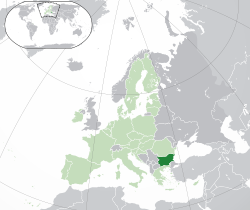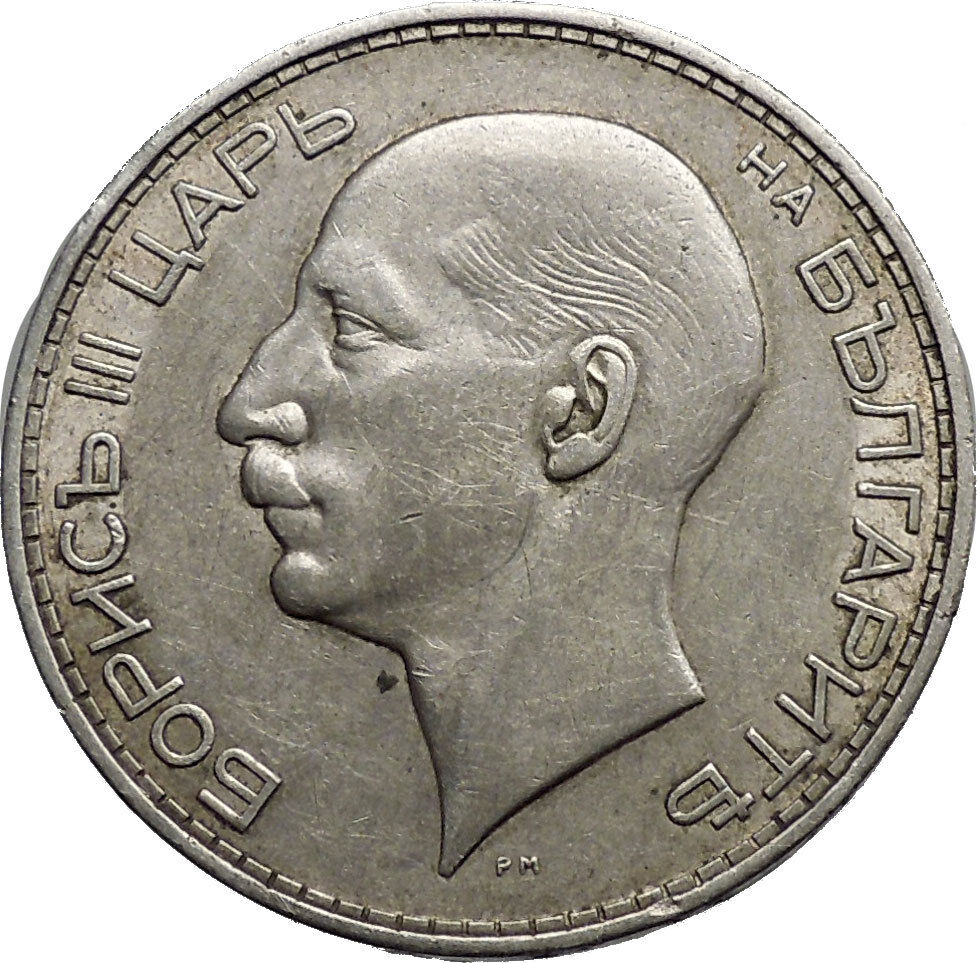|
Bulgaria
40th Anniversary of the Socialist Republic of Bulgaria
1984 Silver 25 Leva 32mm (14.20 grams) 0.500 Silver (0.2251 oz. ASW)
Reference: KM# 148 | Engravers: Lyubomir Prahov, Petar Braikov
НАРОДНА РЕПУБЛИКА БЪЛГАРИЯ 1944 – 1984 25 ЛЕВА, Coat of arms of People’s
Republic of Bulgaria.
ЧЕТИРИ- ДЕСЕТ ГОДИНИ СОЦИАЛИ- СТИЧЕСКА БЪЛГАРИЯ, Structure radiating
floral and atomic themes.
You are bidding on the exact item pictured, provided with a Certificate of Authenticity and Lifetime Guarantee of Authenticity.
 The 1988 Winter Olympics, officially known as the XV Olympic Winter Games (French: XVes Jeux olympiques d’hiver) and commonly known as Calgary 1988, was a multi-sport event held from February 13 to 28, 1988, in Calgary, Alberta, Canada. It was the first Winter Olympic Games to be held for 16 days, like the counterpart Summer Olympic Games. The majority of the contested events took place in Calgary itself. However, the skiing events were held west of the city at the Nakiska ski resort in Kananaskis Country and at the Canmore Nordic Centre Provincial Park in the town of Canmore. The 1988 Winter Olympics, officially known as the XV Olympic Winter Games (French: XVes Jeux olympiques d’hiver) and commonly known as Calgary 1988, was a multi-sport event held from February 13 to 28, 1988, in Calgary, Alberta, Canada. It was the first Winter Olympic Games to be held for 16 days, like the counterpart Summer Olympic Games. The majority of the contested events took place in Calgary itself. However, the skiing events were held west of the city at the Nakiska ski resort in Kananaskis Country and at the Canmore Nordic Centre Provincial Park in the town of Canmore.
In 1988, a record of 57 National Olympic Committees (NOC) that sent the total of 1,423 athletes to these Games. These Winter Olympics would be the last attended one for both the Soviet Union and East Germany NOCs. Just like the 1976 Summer Olympics, Canada failed again to win a gold medal in an official medal event on home soil. The Finnish ski jumper, Matti Nykänen, and the Dutch speed skater, Yvonne van Gennip, won three individual gold medals each. The 1988 Winter Olympics were also remembered for the “heroic failure” of both the British ski jumper, Michael Edwards, and the debut of the Jamaica national bobsleigh team. The both of them became subjects of major feature films about their participation in these Games: Cool Runnings by Disney in 1993 and Eddie the Eagle by 20th Century Studios in 2016.
At approximately C$829 million, the Calgary Games were one of the most expensive Olympics ever held at the time. The facilities that were built for these Winter Olympics helped the Calgary region turn into the heart of Canada’s elite winter sports program, under the tutelage of WinSport. The five purpose-built venues for those Games continued to be used mostly for training and hosting various winter sporting events every year. These experiences helped Canada develop into one of the top nations in Winter Olympics competition. The climax of this effort was the overall first place finish at the 2010 Winter Olympics in Vancouver.

Bulgaria (Bulgarian: България, tr. Bǎlgariya), officially the Republic of Bulgaria (Bulgarian: Република България, tr. Republika Bǎlgariya, IPA: [rɛˈpublikɐ bɐɫˈɡarijɐ]), is a country in southeastern Europe. It is bordered by Romania to the north, Serbia and Macedonia to the west, Greece and Turkey to the south, and the Black Sea to the east. With a territory of 110,994 square kilometres (42,855 sq mi), Bulgaria is Europe’s 16th-largest country.
 Organised prehistoric cultures began developing on current Bulgarian lands during the Neolithic period. Its ancient history saw the presence of the Thracians, Ancient Greeks, Persians, Celts, Romans, Goths, Alans and Huns. The emergence of a unified Bulgarian state dates back to the establishment of the First Bulgarian Empire in 681 AD, which dominated most of the Balkans and functioned as a cultural hub for Slavs during the Middle Ages. With the downfall of the Second Bulgarian Empire in 1396, its territories came under Ottoman rule for nearly five centuries. The Russo-Turkish War of 1877-78 led to the formation of the Third Bulgarian State. The following years saw several conflicts with its neighbours, which prompted Bulgaria to align with Germany in both world wars. In 1946 it became a one-party socialist state as part of the Soviet-led Eastern Bloc. In December 1989 the ruling Communist Party allowed multi-party elections, which subsequently led to Bulgaria’s transition into a democracy and a market-based economy. Organised prehistoric cultures began developing on current Bulgarian lands during the Neolithic period. Its ancient history saw the presence of the Thracians, Ancient Greeks, Persians, Celts, Romans, Goths, Alans and Huns. The emergence of a unified Bulgarian state dates back to the establishment of the First Bulgarian Empire in 681 AD, which dominated most of the Balkans and functioned as a cultural hub for Slavs during the Middle Ages. With the downfall of the Second Bulgarian Empire in 1396, its territories came under Ottoman rule for nearly five centuries. The Russo-Turkish War of 1877-78 led to the formation of the Third Bulgarian State. The following years saw several conflicts with its neighbours, which prompted Bulgaria to align with Germany in both world wars. In 1946 it became a one-party socialist state as part of the Soviet-led Eastern Bloc. In December 1989 the ruling Communist Party allowed multi-party elections, which subsequently led to Bulgaria’s transition into a democracy and a market-based economy.

Bulgaria’s population of 7.2 million people is predominantly urbanised and mainly concentrated in the administrative centres of its 28 provinces. Most commercial and cultural activities are centred on the capital and largest city, Sofia. The strongest sectors of the economy are heavy industry, power engineering, and agriculture, all of which rely on local natural resources.
The country’s current political structure dates to the adoption of a democratic constitution in 1991. Bulgaria is a unitary parliamentary republic with a high degree of political, administrative, and economic centralisation. It is a member of the European Union, NATO, and the Council of Europe; a founding state of the Organization for Security and Co-operation in Europe (OSCE); and has taken a seat at the UN Security Council three times.
|





 The 1988 Winter Olympics, officially known as the XV Olympic Winter Games (French: XVes Jeux olympiques d’hiver) and commonly known as Calgary 1988, was a multi-sport event held from February 13 to 28, 1988, in Calgary, Alberta, Canada. It was the first Winter Olympic Games to be held for 16 days, like the counterpart Summer Olympic Games. The majority of the contested events took place in Calgary itself. However, the skiing events were held west of the city at the Nakiska ski resort in Kananaskis Country and at the Canmore Nordic Centre Provincial Park in the town of Canmore.
The 1988 Winter Olympics, officially known as the XV Olympic Winter Games (French: XVes Jeux olympiques d’hiver) and commonly known as Calgary 1988, was a multi-sport event held from February 13 to 28, 1988, in Calgary, Alberta, Canada. It was the first Winter Olympic Games to be held for 16 days, like the counterpart Summer Olympic Games. The majority of the contested events took place in Calgary itself. However, the skiing events were held west of the city at the Nakiska ski resort in Kananaskis Country and at the Canmore Nordic Centre Provincial Park in the town of Canmore.
 Organised prehistoric cultures began developing on current Bulgarian lands during the Neolithic period. Its ancient history saw the presence of the Thracians, Ancient Greeks, Persians, Celts, Romans, Goths, Alans and Huns. The emergence of a unified Bulgarian state dates back to the establishment of the First Bulgarian Empire in 681 AD, which dominated most of the Balkans and functioned as a cultural hub for Slavs during the Middle Ages. With the downfall of the Second Bulgarian Empire in 1396, its territories came under Ottoman rule for nearly five centuries. The Russo-Turkish War of 1877-78 led to the formation of the Third Bulgarian State. The following years saw several conflicts with its neighbours, which prompted Bulgaria to align with Germany in both world wars. In 1946 it became a one-party socialist state as part of the Soviet-led Eastern Bloc. In December 1989 the ruling Communist Party allowed multi-party elections, which subsequently led to Bulgaria’s transition into a democracy and a market-based economy.
Organised prehistoric cultures began developing on current Bulgarian lands during the Neolithic period. Its ancient history saw the presence of the Thracians, Ancient Greeks, Persians, Celts, Romans, Goths, Alans and Huns. The emergence of a unified Bulgarian state dates back to the establishment of the First Bulgarian Empire in 681 AD, which dominated most of the Balkans and functioned as a cultural hub for Slavs during the Middle Ages. With the downfall of the Second Bulgarian Empire in 1396, its territories came under Ottoman rule for nearly five centuries. The Russo-Turkish War of 1877-78 led to the formation of the Third Bulgarian State. The following years saw several conflicts with its neighbours, which prompted Bulgaria to align with Germany in both world wars. In 1946 it became a one-party socialist state as part of the Soviet-led Eastern Bloc. In December 1989 the ruling Communist Party allowed multi-party elections, which subsequently led to Bulgaria’s transition into a democracy and a market-based economy.





